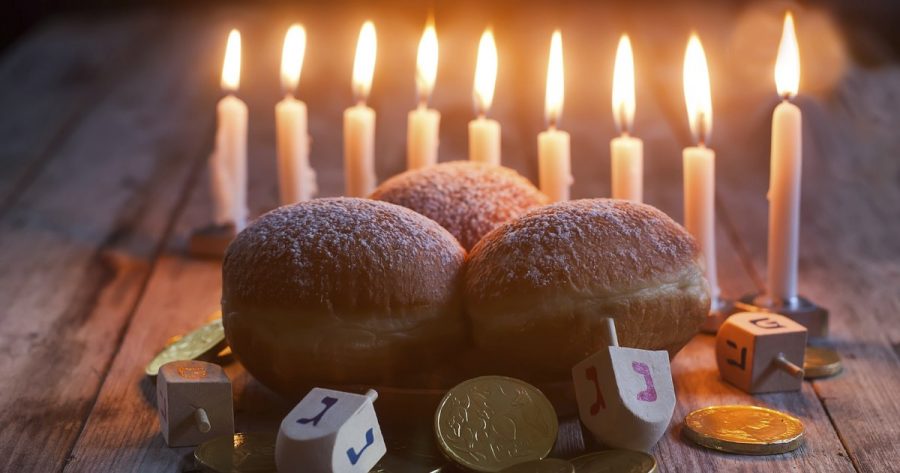Say Heˈlō to Hanukkah: Everything You Need To Know
Hanukkah Starts on the 12th of December and ends on the 20th of December. Get ready to celebrate!
December 8, 2017
Hanukkah is fast approaching, and that means it’s time to get your menorahs and memorize your blessings. For those who may not know what Hanukkah is or when it starts, Hanukkah is the festival of lights, as well celebrating the second Jewish temple in Jerusalem, and is celebrated from the 25th day of Kislev, which is the 12th of this month, to the 2nd day of Tevet, which is the 20th of this month. Hanukkah changes every year because the Jewish calendar is lunar-solar, and the months are based on the cycles of the moon.
Jewish people celebrate Hanukkah in celebration of the revolt of the Jews from their Greek-Syrian despots. Synagogues were looted, and the Jews were only left enough oil to light one candle on the menorah for one night. As the story entails, the Jews prayed in the name of God for a miracle. In return for their prayers, God allowed the oil to light the Temple for eight full days.
Now, the holiday is celebrated by lighting a menorah, also called a hanukkiyah (hence the holiday name).You place the candles in right to left, but light them left to right. You start with the middlemost light, lighting it on the first night, and using that candle to light the first of the other eight candles, meaning on the first night you will have two lights lit. Remember to let them completely melt! The candles are lit over the course of the eight nights, up until the eighth, and last, night.
While lighting the first candle, you are to say a blessing, which is “ Baruch atah, Adonai Eloheinu, Melech haolam, shehecheyanu v’kiy’manu v’higianu laz’man hazeh.” This blessing is only for the first night. Every other night has two different blessings, which are “Baruch atah, Adonai Eloheinu, Melech haolam, asher kid’shanu b’mitzvotav v’tsivanu l’hadlik ner shel Hanukkah.” This blessing means “Blessed are You, Adonai our God, Sovereign of all, who hallows us with mitzvot, commanding us to kindle the Hanukkah lights.” The second every night blessing is “Baruch atah, Adonai Eloheinu, Melech haolam, she-asah nisim laavoteinu v’imoteinu bayamim hahaeim baz’man hazeh.”
During the celebration, there are foods, blessings, games, and so much more to share with the ones you love. Children are normally given dreidels, which are small, usually wooden spinning tops. The four sides have four different Hebrew letters, gimmel, shin, hey, and nun. Players begin by putting a number of coins between them, but don’t worry, they’re just chocolate coins, known as gelt! Each player gets to take turns spinning the dreidel, and whatever side is face up is how much of the gelt you get. Gimmel means to take all, shin means to put one in, hey means to take half, and nun means you get none.
No matter what you end up with in chocolate, there’s always plenty of sweets and delicious foods that the holiday brings to the dinner table, such as latkes and sufganiyot. Latkes are fried potato pancakes, and resemble hashbrowns. They can be eaten with applesauce or sour cream, and are a nice treat regardless of the topping. Sufganiyot are small powdered jelly donuts, and are usually filled with a raspberry jam. There’s also the odd but tasty noodle kugel, which like the latkes, can be sweet or savory, sweet being made with dairy, and the savory being made without. All of these festive foods give a plethora to choose from, but there is one stipulation; you can’t eat dairy and meat together. It’s a small price to pay for such great food.
Hanukkah is a wonderful time, perfect for spending time with those you love, and getting to celebrate the miracle of the oil burning for eight days. As families across Colorado prepare for the holiday, we hope we have shed some light on the festivities that Hanukkah brings. טיולים בטוחים, Safe travels, and חג שמח, happy holidays!


